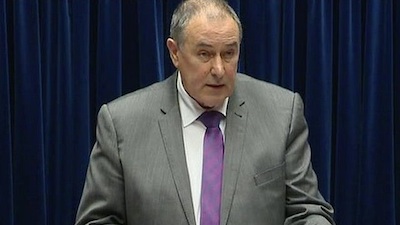
Sinn Fein’s Mitchel McLaughlin is expected to become Speaker of the Six-County Assembly as an outcome of the recent talks that resulted in the Stormont House Agreement
The veteran politician should have already succeeded the DUP’s Willie Hay as part of an arrangement reached as far back as 2007. The role has been vacant since Hay stepped down due to ill health last year.
The two parties had agreed that Sinn Fein would take over the speaker’s role half way through the current assembly term.
But the DUP reneged on the deal to support a Sinn Fein candidate for the job when DUP leader Peter Robinson insisted the speaker’s appointment be tied into Sinn Fein support for Tory welfare reform plans.
This week the DUP said it would now agree to support the election of a new Speaker after it said Sinn Fein backed welfare reform proposals in last week’s ‘Stormont House Agreement’.
Sinn Fein said the election of the speaker would be the first item of business at the assembly on Monday morning.
Another issue discussed before Christmas has also seen progress, with legislation introduced at Westminster that will give the Six County Executive the power to set its own rate of corporation tax.
The rate of corporation tax is 21 per cent in the Six Counties, while the rate in the South is just 12.5 per cent or less, a factor long blamed by the political establishment in the North for the low rate of foreign investment there.
Progress of the Bill, which the British government hopes will come into law before May, is linked to the five main political parties in the North delivering on their commitments to the Stormont House Agreement, particularly on welfare reform and other budgetary matters.
However, Sinn Fein and the Alliance Party remain the only parties to have ratified the talks deal, while the Ulster Unionist Party and the SDLP have refused to support it.
Unionists have particularly condemned a recent decision to scrap plans for a special north Belfast ‘parading panel’ to examine the issue of sectarian parades in that area.
UUP leader Mike Nesbitt said his party thought the Stormont deal remained too vague, and that there was a suspicion that side deals may have been discussed outside the main body of talks “based on previous bitter experience”, he said.
“The Ulster Unionist Party was not at the heart of the talks process -- we see no reason to become the main cheerleaders and sales force now,” he added.
The SDLP has also said it would not endorse the deal, blaming a lack of detail, but that it would work to implement “strong” points and correct “weak” ones, such as the lack of a Bill of Rights, an Irish Language act, a civic forum and to “free up the potential of North/South [institutions]”.
Sinn Fein leader Gerry Adams said his party Ard Chomhairle (high council) believed progress had been made in “defending the most vulnerable against the Tory welfare and budget cuts”.
“They also recognised that progress has been made with regard to the issues of flags, the past and parading,” he said.
“The Ard Chomhairle accepted that there was more to do at a community, political and national level to resolve these matters.”
![[Irish Republican News]](https://republican-news.org/graphics/title_gifs/rn.gif)
![[Irish Republican News]](https://republican-news.org/graphics/title_gifs/harp.gif)

